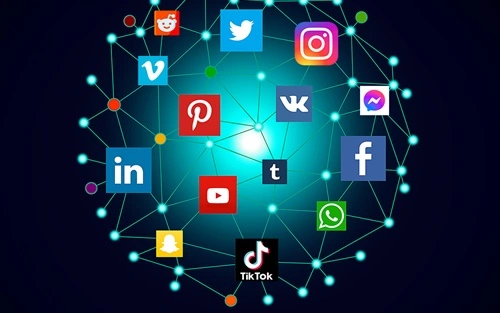Social media has become an integral part of modern life, influencing how we communicate, share information, and engage with the world around us. Platforms like Facebook, Instagram, Twitter, TikTok, and LinkedIn have transformed personal and professional interactions, enabling people to connect instantly across the globe. While social media offers numerous advantages, it also has its share of drawbacks that impact mental health, privacy, and societal dynamics.
This article explores the pros and cons of social media, providing a comprehensive view of its benefits and challenges.
The Pros of Social Media

1. Connectivity and Networking
Social media bridges geographical gaps, allowing individuals to connect with family, friends, and colleagues regardless of location. It also enables networking opportunities for professionals, helping people expand their social and business circles.
2. Information Sharing
Social media serves as a powerful tool for sharing news, ideas, and knowledge. Users can stay updated on current events, trends, and topics of interest in real time. This accessibility has made social media a valuable resource for education and awareness.
3. Business and Marketing Opportunities
For businesses, social media offers a cost-effective platform to promote products and services. Companies can reach target audiences, build brand awareness, and engage customers through tailored content, advertising, and direct interactions.
4. Creativity and Self-Expression
Social media platforms provide a space for users to showcase their creativity, whether through art, writing, photography, or video content. Platforms like Instagram, YouTube, and TikTok have launched countless careers in the arts and entertainment industries.
5. Community Building
Social media fosters the creation of online communities based on shared interests, beliefs, or hobbies. From fitness groups to support forums, these communities provide a sense of belonging and mutual support.
6. Educational Benefits
Social media is a valuable learning tool, offering access to tutorials, webinars, and educational content. Educators and learners alike use platforms like YouTube, LinkedIn, and Twitter to share insights and resources.
7. Advocacy and Activism
Social media empowers individuals to advocate for causes and mobilize support for social, political, and environmental issues. Campaigns such as #MeToo and #BlackLivesMatter demonstrate the potential of social media to drive meaningful change.
8. Job Opportunities
LinkedIn and similar platforms allow job seekers to connect with potential employers and recruiters. Social media also provides freelancers and small business owners a space to showcase their work and attract clients.
9. Entertainment
Social media offers endless entertainment options, from funny memes and viral videos to live streams and interactive challenges. It serves as a source of relaxation and enjoyment for users of all ages.
10. Real-Time Communication
Platforms like Twitter and WhatsApp enable instant communication, making social media a critical tool during emergencies, natural disasters, or important announcements.
The Cons of Social Media
1. Mental Health Concerns
Excessive use of social media has been linked to issues like anxiety, depression, and low self-esteem. Comparing oneself to others’ curated lives can lead to feelings of inadequacy and unhappiness.
2. Addiction
Social media platforms are designed to keep users engaged, often leading to addictive behavior. Spending excessive time scrolling can interfere with productivity, relationships, and overall well-being.
3. Cyberbullying and Harassment
The anonymity of social media can embolden individuals to engage in cyberbullying or harassment. This can have severe emotional and psychological consequences for victims, particularly young users.
4. Privacy and Security Risks
Social media platforms collect and store vast amounts of personal data, raising concerns about privacy and data breaches. Users may unknowingly share information that could be exploited by hackers or used for unauthorized purposes.
5. Spread of Misinformation
False information and fake news spread quickly on social media, often leading to confusion and mistrust. This issue has become particularly problematic during elections, pandemics, and other critical events.
6. Negative Impact on Relationships
Overuse of social media can strain personal relationships. Miscommunication, jealousy, and neglecting in-person interactions are common issues stemming from excessive social media use.
7. Time Consumption
Social media can be a major time sink, diverting attention from more meaningful or productive activities. Many users find themselves spending hours online without realizing how much time has passed.
8. Echo Chambers and Polarization
Social media algorithms often show users content that aligns with their beliefs, creating echo chambers. This can reinforce biases, limit exposure to diverse perspectives, and contribute to political and social polarization.
9. Health Risks
Prolonged screen time associated with social media use can lead to physical health problems such as eye strain, poor posture, and disrupted sleep patterns. Blue light from screens can interfere with the body’s natural sleep cycle.
10. Commercialization and Exploitation
While social media offers marketing opportunities, it has also led to excessive commercialization. Users are constantly bombarded with ads, influencer promotions, and sponsored content, which can feel intrusive and exploitative.
Balancing the Pros and Cons of Social Media
While social media has undeniable benefits, its potential downsides require careful management. Here are some strategies to maximize the advantages and minimize the risks:
- Set Boundaries: Limit screen time and designate specific periods for using social media.
- Curate Your Feed: Follow accounts that inspire, educate, or bring joy, and unfollow those that contribute to negativity.
- Protect Your Privacy: Regularly review privacy settings and avoid sharing sensitive personal information.
- Be Critical of Content: Verify the accuracy of information before sharing it and avoid spreading unverified claims.
- Engage Mindfully: Use social media for meaningful interactions rather than mindless scrolling.
- Take Breaks: Periodically disconnect from social media to recharge and focus on real-life connections.
Who Should Use Social Media?
Social media can benefit various groups, including:
- Businesses: To reach new customers and build brand loyalty.
- Content Creators: To showcase their work and connect with audiences.
- Students and Educators: To access educational resources and engage in discussions.
- Advocates and Activists: To raise awareness and organize campaigns.
- Individuals: To stay connected with friends, family, and global events.
However, social media may not be ideal for those who struggle with addiction, privacy concerns, or mental health issues.
Conclusion
Social media is a powerful tool that has reshaped communication, business, and society as a whole. Its benefits—such as connectivity, information sharing, and creative expression—make it an essential part of modern life. However, its challenges, including mental health concerns, privacy risks, and the spread of misinformation, require responsible use.
By understanding the pros and cons of social media, users can make informed decisions about how to integrate it into their lives in a balanced and positive way. For all its complexities, social media remains a double-edged sword—one that, when used wisely, can enrich our lives while minimizing its potential drawbacks.


